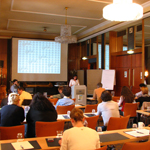The Albanian Transition To Democracy as a Path to European Integration
-
-

-
Presentation speakers
- Elda Gjergji, University of Elbasan “A.Xhuvani”
- Download presentation
Abstract:
Albania, like other post-communist East Central European countries, has been undergoing a multiple transition: a political transition from one party to many, an economic transition from command to market economy, and a social one, from rural society to an urban. For nearly half a century one of the most repressive communist dictatorships in the world, economically impoverished, and lacking a democratic political culture, Albania was considered one of the least likely countries in the region to complete the transition to a stable and prosperous democracy. This paper examines Albania within the context of regional and global changes and focuses on the trials of Albania’s efforts to create a democratic political order. It assesses the degree and significance of changes since the early 1990s and exploring Albania’s prospects for democracy and a market economy after forty-seven years of highly centralized rule. Given political instability in the Balkans, the considerable risk of further regional conflict, and Albania’s importance to regional stability and peace, the outcome of the transition in Albania must provide efficiency. -
Related Presentations

European Identity Policy: Ways Of Formation
- Maria Eremenko





















